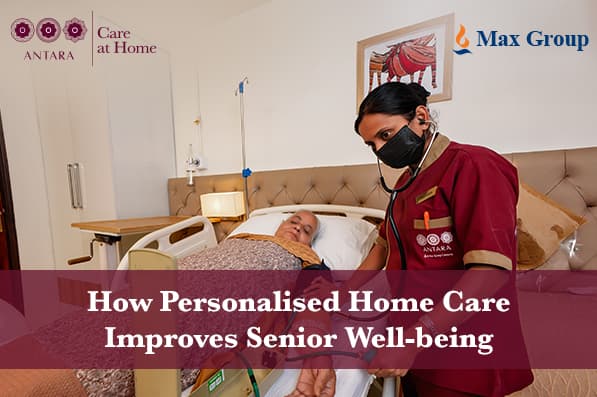
Loading...

Loading...
2025-05-12
Antara
Personalised home care greatly enhances the well-being of seniors, offering tailored support that not only improves the quality of life but also helps reduce hospital visits and cut healthcare costs significantly.

Seniors receiving personalised care plans show stronger self-management skills, especially in handling chronic conditions such as diabetes and heart failure. This personalised approach respects their daily routines while preserving their dignity and autonomy—elements crucial for emotional well-being.
Personal care for elderly individuals goes beyond basic health needs. In-home care settings, caregivers can proactively identify potential hazards, a vital consideration since falls remain a leading cause of injury among seniors. Additionally, the companionship provided helps reduce feelings of isolation and loneliness, substantially boosting mental health. Various home care ideas can be implemented to create environments where seniors maintain control over their lives, fostering a sense of accomplishment and confidence as they participate in daily activities. Furthermore, involving family members in the care planning process ensures that support aligns with the senior's preferences and values, ultimately enhancing their overall quality of life.
Personalised home care is a cornerstone in enhancing elderly wellness. It offers a suite of services that cater to unique health and lifestyle needs. Unlike standardised care approaches, personalised home care adapts to individual circumstances, providing targeted support where most needed.
Personalised care plans thoroughly assess each senior's specific medical, emotional, and daily living requirements. These comprehensive evaluations consider physical health, cognitive function, and personal preferences. Consequently, the resulting care strategies address particular challenges like mobility issues, dietary needs, or chronic health conditions rather than applying generic solutions. This tailored approach has been shown to improve self-management capabilities among seniors, helping them maintain control over their health journey.
Regular health monitoring forms the foundation of effective personalised care. Caregivers assist with crucial daily activities while providing consistent health oversight that prevents complications. This proactive approach includes:
Studies indicate personalised mobile health solutions can reduce hospital admissions and save healthcare costs.
Beyond physical care, personalised home services address seniors' emotional well-being. Caregivers trained in senior care understand their client's emotional needs, creating meaningful companionship that combats isolation. Caregivers often engage seniors in stimulating activities like puzzles and memory games that promote cognitive health. This connection helps reduce feelings of loneliness, increases happiness, and prevents depression.

Staying in familiar surroundings provides comfort and security for seniors. Personal care for elderly individuals in home care settings offers the right balance of assistance and autonomy, empowering them to continue their daily routines safely. This approach helps seniors maintain dignity and independence, essential components for emotional stability and quality of life.
Personalised care actively involves family members in the care planning process. This collaborative approach strengthens family bonds and provides peace of mind. Families gain valuable insights about their loved one's condition while being freed from full-time caregiving stress.
Seniors receiving personalised care typically experience faster recovery from illnesses and improved management of chronic conditions. Home care ideas tailored to individual needs lead to better health outcomes, enhanced mobility, and reduced hospital readmissions.
Personalised home care transforms senior well-being through its multifaceted approach to elderly health and happiness. The tailored care plans address specific health challenges while respecting individual preferences, creating a foundation for improved quality of life. Seniors benefit greatly from consistent health monitoring, which prevents complications and reduces healthcare costs. Additionally, the emotional support provided by trained caregivers helps combat loneliness and depression—issues that plague many elderly individuals living alone.
Family members certainly gain peace of mind knowing their loved ones receive appropriate care while maintaining independence. This balance between assistance and autonomy allows seniors to age with dignity in familiar surroundings, which proves essential for their emotional stability. The collaborative nature of personalised care strengthens family bonds and relieves relatives from caregiver burnout. Above all, personalised home care represents more than just medical assistance—it offers a comprehensive solution that enhances every aspect of senior life.
The future of elderly care lies in these personalised approaches, which recognise each senior as a unique individual with specific needs, preferences, and life experiences. Their improved health outcomes and emotional well-being stand as powerful testimony to the effectiveness of care that treats seniors not as patients but as people deserving respect, dignity, and personalised attention throughout their golden years.
Personalised home care represents a patient-centred, whole-person approach to caring for older adults. This type of care assesses the unique needs of each senior and creates tailored plans that address both clinical and non-clinical requirements. Essentially, personalised care recognises seniors as experts in their own lives, collaboratively engaging them as partners in their care journey. This approach differs from standard care by focusing on individual preferences, lifestyle choices, and specific health conditions rather than applying generic solutions.
Personalised care enhances senior well-being through multiple pathways. Studies show personalised mobile health solutions can reduce hospitalisation costs and improve clinical outcomes. These benefits occur because:
Yes, personalised home care often includes medical services alongside non-medical support. Many agencies provide medication management, vital sign monitoring, and doctor coordination. Home care can also facilitate mobile health solutions that enable remote health monitoring and telehealth visits, thereby reducing transportation costs and improving healthcare access.
Research indicates personalised care plans show improved outcomes when integrated into routine care. Personalised approaches become especially effective because they consider the senior's environment, lifestyle, and personal preferences rather than just treating symptoms. Moreover, these tailored approaches demonstrate higher efficiency, time-saving benefits, and lower mortality rates compared to standard care models.
Creating a personalised care plan begins with a comprehensive assessment. Accordingly, families should:

How Physiotherapy & Rehabilitation Improve Life in Assisted ...

Is It Normal If Parents Struggle After Moving to an Assisted...

What Happens When Families Delay Assisted Living for Parents...

10 healthy meals for seniors that are Quick & Easy to cook

Understanding the Role of Family Involvement in Assisted Liv...

Please fill in the form and submit the details to request an appointment.